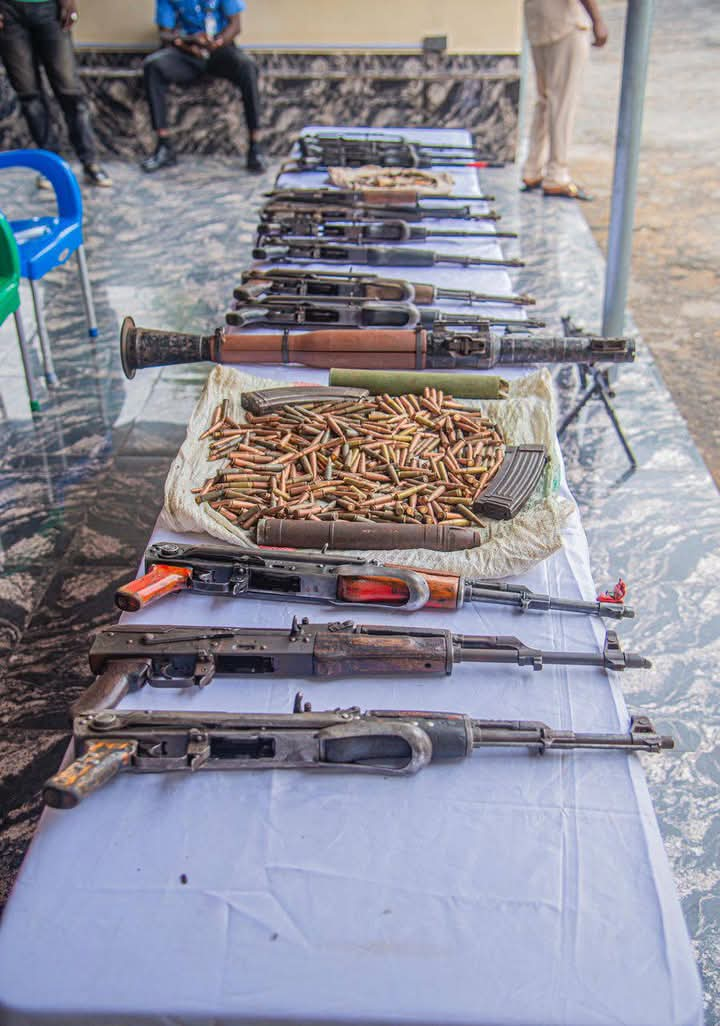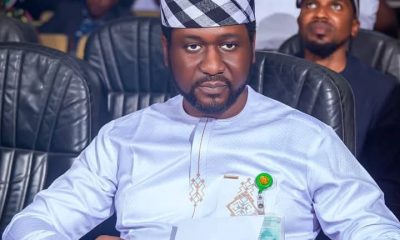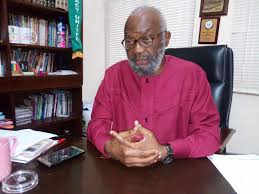COVER
Dangote, Elumelu Make Economic Planning System List

By Lubem Myaornyi, Abuja
President Bola Tinubu has in a strategic move to bolster the nation’s economic governance frameworks and ensure robust and coordinated economic planning and implementation, approved the establishment of the Presidential Economic Coordination Council (PECC) and the creation of the Economic Management Team Emergency Taskforce (EET).
PECC comprises leaders and key government officials like: President of the Federal Republic of Nigeria – Chairman of the PECC; Vice-President of the Federal Republic of Nigeria – Vice-Chairman of the PECC / NEC Chairman; President of the Nigerian Senate; Chairman, Nigeria Governors’ Forum; Coordinating Minister for the Economy and Minister of Finance; Governor of the Central Bank of Nigeria; Minister of Agriculture and Food Security; Minister of Aviation and Aerospace Development; and Minister of Budget and Economic Planning. Others are: Minister of Communications, Innovation and Digital Economy; Minister of Industry, Trade and Investment; Minister of Labour and Employment; Minister of Marine and Blue Economy; Minister of Power; Minister of State, Petroleum Resources; Minister of State, Gas; Minister of Transportation; and Minister of Works.Tinubu also included 13 members of the organized private sector to drive the nation’s economy.The PECC will also comprise key members of the organized private sector, with the following members joining for a period not exceeding one year, subject to the President’s directive: Alhaji Aliko Dangote; Mr. Tony Elumelu; Alhaji Abdulsamad Rabiu; Ms. Amina Maina; Mr. Begun Ajayi-Kadir; Mrs. Funke Okpeke; and Dr. Doyin Salami.The rest members are: Mr. Patrick Okigbo; Mr. Kola Adesina; Mr. Segun Agbaje; Mr. Chidi Ajaere; Mr. Abdulkadir Aliu; and Mr. Rasheed Sarumi.In the president’s determination to address immediate economic challenges and ensure the streamlined execution of economic strategies, President Bola Tinubu has established the Economic Management Team Emergency Taskforce (EET) with a mandate to formulate and implement a consolidated emergency economic plan. The taskforce comprises key government officials and industry leaders in furtherance of the President’s collaborative approach toward achieving economic resilience and growth. The EET is now mandated to submit a comprehensive plan of economic interventions for 2024 to the PECC, covering the next six months, for immediate implementation within two weeks of its inauguration.The EET will meet twice weekly and is composed of the following members: Coordinating Minister for the Economy and Minister of Finance (Chairman of the EET); Minister of Budget and Economic Planning; Minister of Power; Minister of Agriculture and Food Security; Coordinating Minister of Health and Social Welfare; and Minister of Industry, Trade and Investment.Others include: Governor of the Central Bank of Nigeria; National Security Adviser; Chairman, Nigeria Governors’ Forum; Governor of Anambra State; Governor of Ogun State; Governor of Niger State; Executive Chairman, Federal Inland Revenue Service; Director-General, Budget Office of the Federation; GCEO, NNPC Limited; Director-General, Nigeria Economic Summit Group; Special Adviser to the President on Energy; Dr. Bismarck Rewane, Economist; and Dr. Suleyman Ndanusa, Economist.The Economic Management Team, established in October 2023, and chaired by the Coordinating Minister for the Economy and Minister of Finance, serves as the working group under the Presidential Economic Coordination Council (PECC), playing a crucial role in the economic governance structure established by the President. The EMT traditionally meets monthly or as required, but will now suspend its meetings for the duration of the EET’s mandate (six months).The EMT is composed of the following officials: Coordinating Minister for the Economy and Minister of Finance (EMT Chairman); Governor of the Central Bank of Nigeria; Minister of Budget and Economic Planning; Minister of Industry, Trade and Investment; Minister of Communications, Innovation and Digital Economy; Minister of Works; Minister of Labour and Employment; and Minister of Agriculture and Food Security.Other officials include: Minister of State, Petroleum Resources; Minister of State, Gas; Minister of Power; Minister of Transportation; Minister of Aviation and Aerospace Development; and Minister of Marine and Blue Economy.The Chairman of the EMT may, as needed, call on any Federal Minister or Head of Agency to brief the EMT on key programmes and developments affecting the economy.The President’s formation of the PECC, under his Chairmanship, alongside the creation of the EET, led by the Chairman of the EMT, and the EMT itself, is the manifestation of a unified strategy aimed at enhancing Nigeria’s economic management architecture for verifiably improved performance. The formation of these teams will complement existing economic governance structures, including the National Economic Council (NEC), which is chaired by the Vice-President.Over the next six months EET will focus on the rapid implementation, monitoring, and evaluation of critical initiatives, strengthening the Tinubu-led administration’s collective approach to advancing Nigeria’s economic objectives.
COVER
Guinea Insurance Reports N1.42bn Revenue Growth in H1 2025

Guinea Insurance says it generated N1.42 billion revenue growth in the first half of 2025, representing a 12.38 percent increase from N1.27 billion recorded in the same period of 2024.The company announced this through a corporate disclosure through the Nigerian Exchange Ltd.
Profit after tax for the six months period declined by 198. 95 per cent to a loss of N114.7 million from a gain N115. 9 million reported the previous year.The company’s total asset grew from N5.704 billion in the first half of 2024 to N6.97 billion in 2025.Total liabilities stood at N1.86 billion, down from N1.85 billion in June 2024Earnings per share (EPS) of the company dropped to 1.44 kobo from the EPS of 1.46 kobo reported same period last year.N278.07 million was generated as investment income.(NAN)COVER
Benue killings: Police Burst Bandits Hideout, Recover Rifles

From Attah Ede, Makurdi, Joseph Amedu, Lokoja and Dan Amasingha, Minna
Operatives of the Force Intelligence Department–Intelligence Response Team (FID–IRT) have apprehended two notorious illegal arms dealers and some bandits who participated in the recent herdsmen attack on Yelewata community and recovered a cache of deadly weapons in Abinsi town, Guma Local Government Area of Benue State.
The Force police public relations officer (FPPRO), Muyiwa Adejobi who disclosed this in a statement yesterday in Abuja, said the Police operatives successfully intercepted and dismantled a notorious arms supply syndicate responsible for arming bandits in Benue State and other North-Central States. Adejobi explained that on June, 21, operatives of the FID-IRT acting on credible intelligence on the activities of some bandits who participated in the Yelwata killings, stormed the hideout of the bandits in a forest at the boundary of Kardako, Nassarawa State and Yelwata in Benue State.He maintained that a fierce gun duel ensued causing the bandits to flee with various degrees of gunshot injuries and in the process 2 GPMG were recovered from their hideout in the process He added that on July 8, 2025, operatives of the Force Intelligence Department – Intelligence Response Team (FID-IRT), in a tactical operation, along the Lafia–Makurdi expressway in Makurdi, Benue State, arrested one Abubakar Isah, aged 25, found in possession of 3 AK47 rifles and 1002 rounds of 7.62mm live ammunition.According to him, the arrest followed actionable intelligence indicating an impending arms movement intended for distribution to bandits groups known to be terrorizing various communities in Benue State.”In furtherance of Police investigation on the deadly attacks by bandits on communities in Benue State, Police operatives have again successfully intercepted and dismantled a notorious arms supply syndicate responsible for arming bandits in Benue State and other North-Central States.”Further investigations revealed that the arms and ammunition were supplied by a notorious arms dealer, Jacob Adikwu, operating from Abinsi, Guma Local Government area of Benue State, and was to be delivered to one Dan Hassan, a bandit kingpin known for orchestrating deadly attacks against communities across Benue, Nasarawa, Kogi, Niger, and Kwara States.”In another related development, on the 12th of July, 2025, FID-IRT operatives acting on credible intelligence arrested one ibrahim AKA Chelsea, who confessed to have sent the sum of Six Million Five Hundred Thousand Naira( 6,500,000) to the same Adikwu Jacob, Six Million Naira (6,000,000) being payment for delivery of 2 AK47 rifles and 2000 rounds of live ammunition, while Five Hundred Thousand Naira (500,000)would serve as payment for construction of a compartment in the Volkswagen vehicle to conceal the said arms for transportation to Kwara State. “In a swift follow-up clearance operation, the operatives stormed Abinsi town and successfully apprehended Jacob Adikwu on 16th July 2025 and recovered three (3) AK-47 rifles, 220 rounds of live ammunition and a volkswagen car from his hideout. Further investigation carried out by the operatives on the 17th July 2025, led to the recovery of additional five (5) AK-47 rifles, one rocket launcher, and 1000 rounds of live ammunition from the same arms dealer.Adejobi maintained that efforts were being intensified to ensure Dan Hassan and other criminal elements responsible for terrorizing Benue State and other parts of the country are brought to book, while others in custody will have their day in court upon conclusion of investigation.He added that the Inspector-General of Police, Kayode Egbetokun, commended the operatives for their doggedness at all times, and reiterated that there will be no hiding place for those who profit from the bloodshed of innocent Nigerians.Kogi, Kwara Security Joint Forces Arrests 12 Suspected Kidnappers, One InformantTwelve suspected kidnappers and one informant have been arrested in a coordinated security operation carried out across parts of Kogi and Kwara States.This was disclosed by the Kogi State Commissioner for Information and Communications, Kingsley Fanwo through a press statement yesterday in Lokoja.He said the suspects were apprehended during a series of raids jointly executed by the Hybrid Force from the Office of the National Security Adviser and Officers and Men of the Forward Operating Base (FOB), Egbe. The operations covered Isanlu-Esa and Okoloke in Yagba West Local Government Area of Kogi State, and Patigi, Lafiagi and Gbugbu in Kwara State.The statement identified the suspected kidnappers as Mainasara Abubakar, Sadik Abubakar, Jude Sani, Sanda Abubakar, Lawali Usman, Tukur Shehu, Hassan Abubakar, Kabiru Surajo, Makiri Dodo, Bala Hassan, Umaru Sanda, and Ruwa Abubakar. Also arrested was Rabiu Makeri, who is believed to be an informant for the gang.According to the statement, the security forces engaged the suspects in a fierce gun battle, during which some of the kidnappers fled, abandoning their motorcycles and kidnap victims. Several kidnapped women were successfully rescued during the confrontation.The Commissioner further assured the public that the arrested suspects will face full prosecution after investigations, reaffirming the state’s zero-tolerance stance on criminality.In a separate remark, the Executive Chairman of Yagba West LGA and ALGON Chairman for Kogi State, Hon. Tosin Olokun, expressed gratitude to Governor Ahmed Usman Ododo for providing the logistics and support that enabled the success of the operation.“Governor Ododo promised to restore peace to Yagba West and Yagba as a whole. Today, he has backed those words with decisive action. We can now heave a sigh of relief. The people of Yagba are grateful for his leadership and the results it is delivering,” Olokun said.The Kogi State Government emphasized its ongoing commitment to working with federal and regional partners to ensure the safety and security of all communities within the state.Cholera Outbreak Claims 13 Lives over 236 hospitalized in Six Niger LGAsA Cholera outbreak has been reported in parts of Niger State that has claimed twelve lives and led to the hospitalization of about 236 patients.It was gathered that the outbreak was first reported on Sunday in Shiroro local government area of Niger State.The water borne disease has claimed over 12 lives as of Wednesday from over four local government areas of the state.Sources disclosed that the worst hit local government areas are Minna, Bosso, Shiroro, Magama, Bisa and Munya Local government councils.The Health care official noted that over 239 people have been afflicted by the disease and are currently receiving medical attention across several primary healthcare centres across the affected councils.Worried by the development, the State government has opened an isolation centre at the old wing of late Senator Idris Ibrahim Kuta primary healthcare centre along old airport road Minna.Confirming the development, Commissioner of primary healthcare, Dr. Ibrahim Ahmed Dangana said the State government has swung into action by setting up a multi sectoral approach to halt the epidemic in the six local government areas.The Commissioner disclosed that, a treatment and isolation centres has been set up in each of the affected local government areas with a view of arresting the spread.”We have set up treatment and isolation centres to mitigate and also embarking on aggressive sensitization exercises”The campaign is now targeting religious bodies like CAN and Islamic bodies and the entire eight Emirates of the State.”The Commissioner commended Governor Mohammed Umar Bago for his commitment and all the donor agencies for coming to the aid of the State.Collaborating with the Commissioner, Director of public health Ministry of tertiary health care, Dr. Ibrahim Idris said Chanchaga (Minna) Bosso and Shiroro local government area are the worst hit Councils.COVER
CBN Holds MPC Meeting, Maintains Lending Rate at 27.5%

The Central Bank of Nigeria (CBN) has, once again, kept its key lending rate, known as the Monetary Policy Rate (MPR), at 27.5 percent.The Governor of CBN, Yemi Cardoso announced the decision yesterday in Abuja, following the 301st Monetary Policy Committee (MPC) meeting.Cardoso said that all 12 MPC members voted unanimously to hold all key monetary parameters.
The committee, thus, retained the cash reserve ratio at 50 percent for deposit money banks and 16 per cent for merchant banks. It also retained a liquidity ratio at 30 per cent, and the asymmetric corridor was held at +500/-100 basis points around the MPR.With this decision, the MPC has retained the rates for three consecutive meetings. (NAN)




















